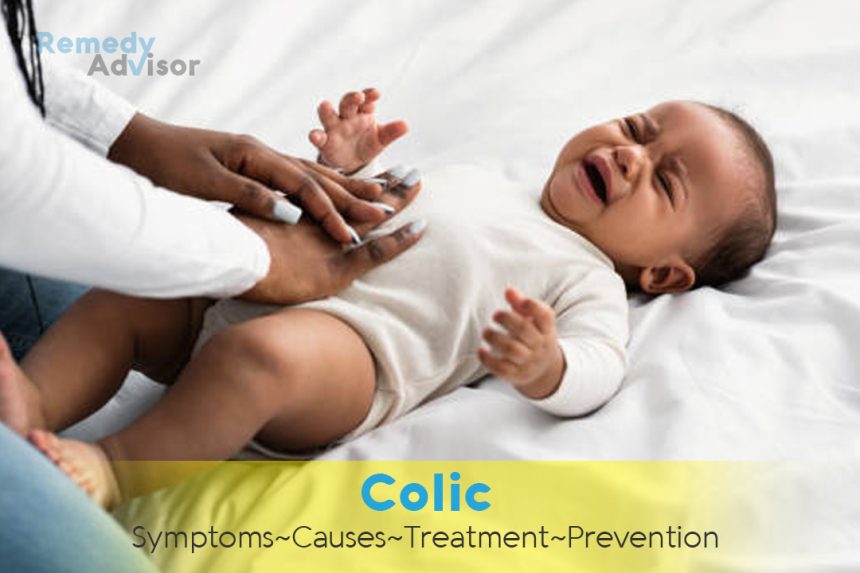What is it
Colic is a common childhood condition marked by prolonged episodes of intense crying, usually during the evening hours. The crying arises suddenly for no apparent reason, and little can be done to stop it: holding, cajoling, burping, changing the diaper, or engaging the infant has no apparent effect. Crying may stop only after the baby (and caregiver) appears exhausted.
Typically, a contented and restful newborn will be brought home from the hospital only to start the pained screaming fits after a week or two. Crying continues for several months, often at the same time each evening. The condition is sometimes referred to as three-month colic because at that age the fits quickly dissipate. Needless to say, colic is a major source of distress for new parents and a major reason for frantic calls to the pediatrician.
Symptoms
- Persistent, inconsolable crying spells in other-wise healthy infants. The spells typically begin after two weeks of age, then quickly subside around three months of age.
- Crying typically starts suddenly, often in the late afternoon or early evening, and may persist for several hours or occur fitfully through the night. The passage of gas or a bowel movement may temporarily halt the crying.
- Crying or screaming may be accompanied by a red or flushed face, clenched fists, drawn-in legs, a tense abdomen, and rumbling in the stomach.
- During an episode, a colicky child may initially suck hungrily at a bottle, breast, or pacifier but then quickly refuse it and resume crying.
What causes it
The cause of colic is unknown. The word colic means of the abdomen, and the condition may be a response to abdominal spasm and pain, perhaps caused in part by air that is swallowed during crying. Some experts think it may be triggered by an infant’s frustration at being unable to interact with the environment, particularly during the early evening hours when the household is often busiest. Fatigue may also be a contributing factor.
It is essential to differentiate colic from specific ailments that may result cramping or abdominal pain and continued crying, including intestinal obstruction, infection and food allergies. If no physical reasons are found, colic is commonly the analysis.
What if you do nothing
Colic is not a serious illness. All infants outgrow it, usually soon after their third month. Excessive crying is not harmful. Infants with colic are otherwise healthy, and they grow and gain weight at a normal rate.
Home remedies
Effective treatments are difficult for a condition in which the cause is so uncertain. Supportive reassurance is the best approach. Holding, snuggling, gentle rocking or swaying, walking with your infant, and other hands-on measures that reinforce the child’s sense of security are always a good idea. In addition, you can try the following measures.
Divert the child
Take the baby for a ride in the car. Play soft music, or use the gentle hum of an air conditioner or radio static in the child’s room. Give the baby a pacifier, but don’t automatically feed the child every time he or she cries; this can contribute to bloating. Also, try not to over stimulate the child with too much distraction.
Use proper feeding techniques
Feed the baby in a semi-upright position, and continue holding the baby upright for about 15 minutes after feeding. Whether you are bottle-or breast-feeding, it’s important to burp the baby. (If you are bottle-feeding, also be sure to use the appropriate bottle and nipple size for the child’s age.)
Use gentle stroking
Massage the stomach using smooth, gentle strokes. Or, drape the child, stomach down, along your forearm with the head in the crook of your elbow and arms and legs dangling over either side of your arm; then gently massage the back.
Try gentle warmth
Place the child’s stomach down on a warm heating pad or washcloth or on a hot water bottle placed on your lap. You can also try warm baths or swaddling the baby in a soft blanket.
Stay calm and rested
If you are anxious and upset, your child may become more irritable. Take turns caring for the baby with other caregivers. Periodic breaks will increase your coping skills.
Prevention
Nothing can be done to prevent colic, since so little is known about its cause. Other causes of crying should be ruled out. A supportive, attentive home environment may be the best safe-guard.







